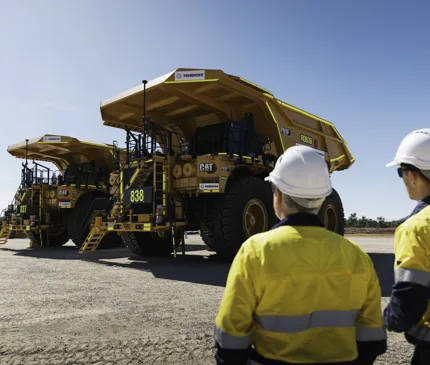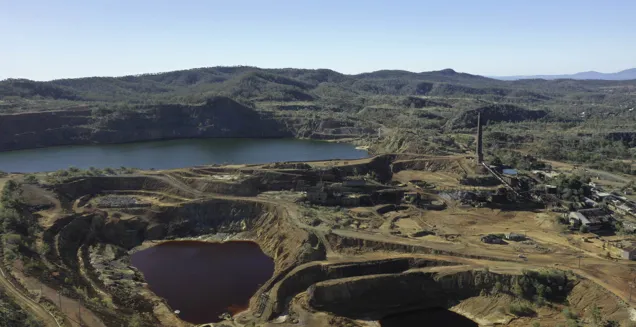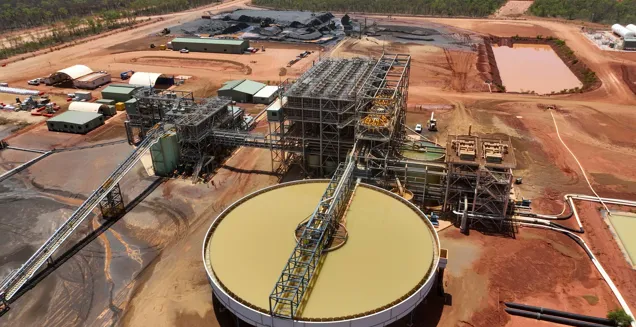Olive Downs Steelmaking Coal Project
Explore how NAIF's financing supported the Olive Downs Steelmaking Coal Project, creating jobs and economic growth in Queensland's Bowen Basin.
April 2021
Resources
Bowen Basin, QLD

NAIF’s loan towards the construction and development of the Olive Downs Steelmaking Coal Project helped create more than 1,200 jobs and boost the delivery of high-quality coking coal to key markets including Japan, South Korea and India.
About Pembroke Resources
Founded in 2014, Pembroke Resources is a dynamic mining company specialising in the exploration, development and extraction of vital natural resources, with a primary focus on steelmaking coal.
At the forefront of the industry, Pembroke Resources is deeply involved in every stage of the coal-mining process, from the initial identification of potential coal reserves to the meticulous extraction, processing, and seamless exportation of coal to the market. With a commitment to excellence, Pembroke Resources is driving innovation within the natural resource sector.
Project Overview
The Olive Downs Steelmaking Coal Project, situated in the Bowen Basin 40 km south-east of Moranbah in Queensland, created more than 1,200 jobs during construction.
Ramping up from an initial production of 4.5 million tonnes of steelmaking coal per annum, at peak production Olive Downs is forecast to produce up to 15 million tonnes per annum. The coal is transported by rail to the Dalrymple Bay Coal Terminal for export to key international markets such as Japan, South Korea, Vietnam, and India.
Construction of the mine was completed in early 2024. The Olive Downs Complex is now a fully operational mine, employing a workforce of over 600 people. Pembroke offers employees a genuine choice to live in towns across the region. Over 35% of their workforce permanently reside within the Isaac region or neighbouring local government areas of Mackay, Central Highlands, and Whitsunday.
How We Helped
NAIF approved financing of up to $167.5 million to support the first phase of construction at the Olive Downs Steelmaking Coal Project in Queensland’s Bowen Basin.
Our support funded enabling works such as roads, water, rail and power supply, encouraged private investment by providing early confidence in the project’s financial structure, and de-risked development through tailored finance that matched the long-life nature of steelmaking coal infrastructure.
Through this support, Pembroke Resources advanced a project that delivered essential infrastructure, supported jobs in regional Queensland, and strengthened supply into international steelmaking markets.
Public Benefit
The project is forecast to contribute more than 1,200 jobs during construction and operations.
The benefit to the Queensland economy and the Central Queensland region is forecast to reach more than $6 billion during the construction phase. Pembroke Resources estimates that the project will contribute more than $10 billion in public benefit over the life of mine.
Related Links
Indigenous Engagement
- The Barada Barna people
The Barada Barna people are the Traditional Owners of the land on which the Olive Downs Complex is located, as well as surrounding areas in the Bowen Basin. Barada Barna Country features significant cultural and ecological areas, including rock art and diverse ecosystems typical of Central Queensland’s inland environments, such as various woodlands and grasslands. The Barada Barna people received their Native Title determination over their traditional lands, which stretch from the Connors Range in the east, to Middlemount in the south, the Peak Ranges in the west, and Lake Elphinstone in the north. The Barada Barna Aboriginal Corporation (BBAC) represents the Barada Barna people’s Native Title interests and works to protect country, traditions, lore, language, and culture, while also delivering economic, social, and cultural benefits to the community.
Indigenous Engagement Strategy Commitments
Pembroke’s approach to Indigenous engagement prioritises meaningful partnerships and opportunities for the Barada Barna people, the Traditional Owners of the land upon which the Olive Downs Complex operates. Shortly after the acquisition of Olive Downs, Pembroke voluntarily agreed upon an Indigenous Land Use Agreement (ILUA) with the Barada Barna Aboriginal Corporation. The ILUA provides the framework for the co-existence of native title obligations, pastoral activities and sustainable mining operations across the Olive Downs Complex, establishing a collaborative partnership from the outset.
Key participation commitments include a 5% target for First Nations ‘new to industry’ traineeships across all production and maintenance areas of the project in the operation phase of the project.
- Committed to developing an Indigenous Participation Policy, and Indigenous Employment Strategy (IES), as well as an Indigenous Recruitment Strategy in partnership with the BBAC to target Barada Barna Traditional Owners for workforce and procurement opportunities.
- Overarching commitments include the development of a project specific Indigenous Employment and Engagement Committee to help facilitate transparent and continuous communication with Pembroke Resources, Thiess, BBAC and Barada Barna people to support outcomes for the Barada Barna.
Indigenous Engagement Strategy Outcomes
- In 2022 and 2023, during the construction phase, Pembroke worked closely with the BBAC to support cultural heritage initiatives. Pembroke also established the Indigenous Engagement Committee with BBAC to oversee the IES, contributing to First Nations employment reaching 4.9%.
- In 2024, as the project transitioned into the operational phase, the First Nations workforce increased to 6.2%, including a number of Barada Barna Traditional Owners. While direct procurement and training outcomes remained limited during this period, Pembroke began scoping new First Nations procurement opportunities and employment pathways.
- Pembroke and its contractor, Thiess, progressed the Economic Empowerment Program and planned the rollout of Thiess’ ‘New to Industry’ training program, designed to onboard a cohort of First Nations jobseekers into operational roles.
- As of 30 June 2025, Pembroke Resources has fully repaid their loan, as such there are no further reporting obligations to NAIF under their Indigenous Engagement Strategy (IES), however, the project will continue to generate jobs and long-term economic benefits for the region.


